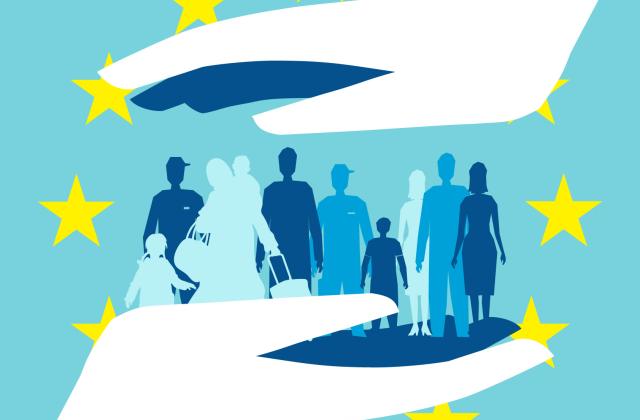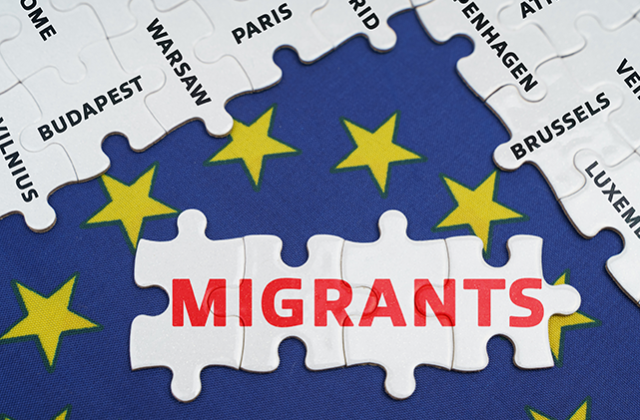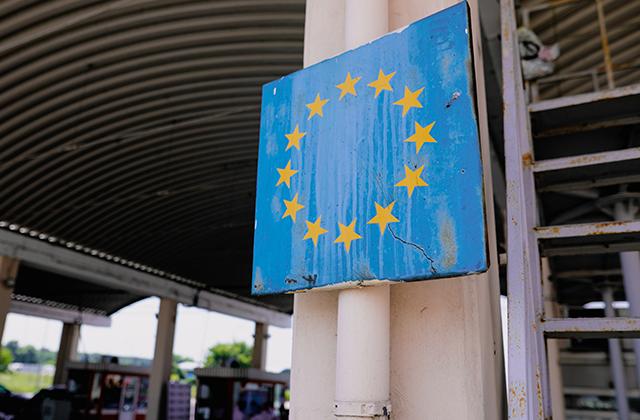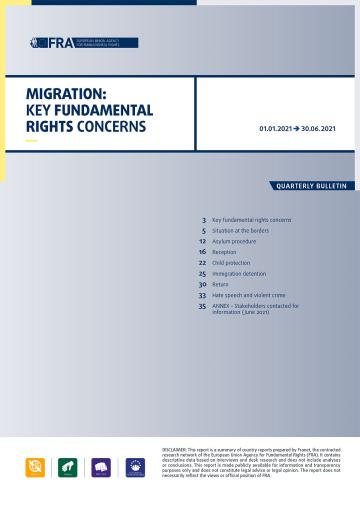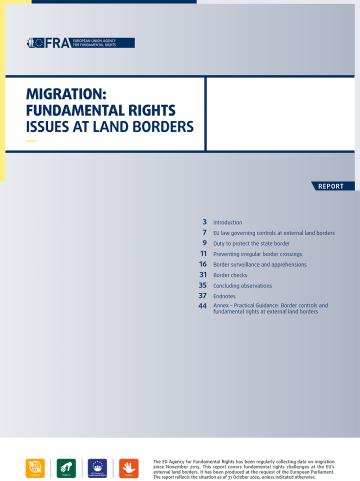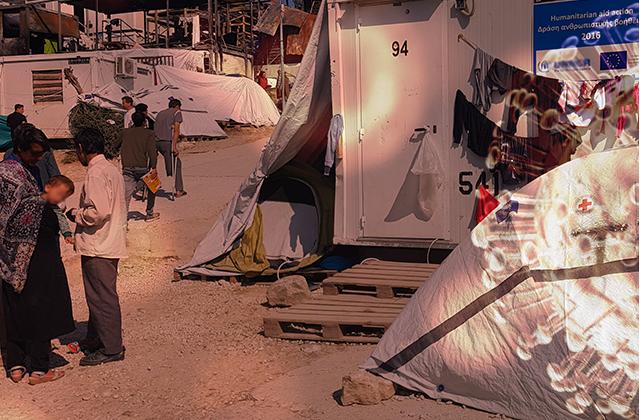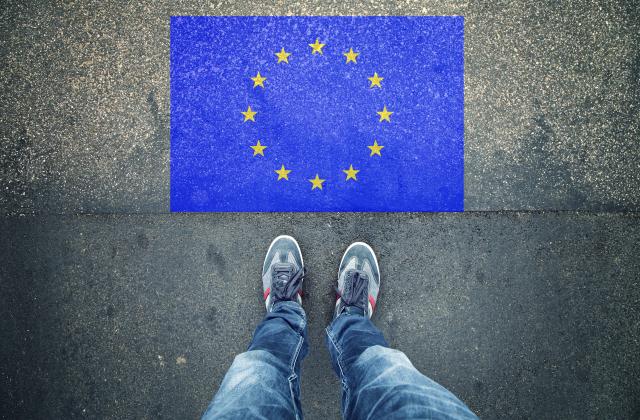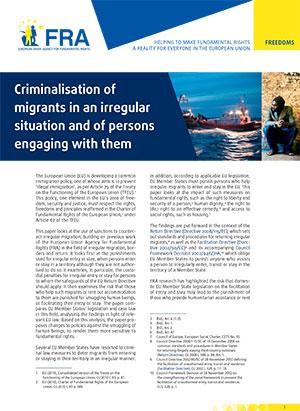- Measures to counter the instrumentalisation of migrants and refugees should first be directed towards the third country and their officials and/or other persons that use migrants to destabilise the EU or a Member State.
- There are several measures that the EU and its Member States may take against specific individuals or third countries without infringing EU or international law. When strictly observing the safeguards in place, the measures described in this chapter can be compatible with EU fundamental rights law.
- The smuggling of migrants is a transnational organised crime. The EU and its Member States may use the mechanisms and forums under the UN framework to discuss and address state-sponsored smuggling of migrants.
-
Article 3(a) of the UN Protocol against the Smuggling of Migrants by Land, Sea and Air (‘UN Anti-smuggling Protocol’ or ‘Protocol’) defines ‘smuggling of migrants’ as ‘the procurement, in order to obtain, directly or indirectly, a financial or other material benefit, of the illegal entry of a person into a State Party of which the person is not a national or a permanent resident’. Under Article 4, the Protocol applies to the prevention, investigation and prosecution of migrant smuggling where the offences are transnational in nature and involve an organised criminal group as defined in the UN Convention against Transnational Organized Crime (UNTOC). The EU [16]
Council Decision 2006/616/EC of 24 July 2006 on the conclusion, on behalf of the European Community, of the Protocol Against the Smuggling of Migrants by Land, Sea and Air, supplementing the United Nations Convention Against Transnational Organised Crime concerning the provisions of the Protocol, in so far as the provisions of this Protocol fall within the scope of Article 179 and Article 181(a) of the Treaty establishing the European Community, OJ L 262, 22.9.2006, p. 24, ELI: http://data.europa.eu/eli/dec/2006/616/oj.
and all its Member States except Ireland are contracting parties, along with all neighbouring third countries with land borders to the EU and most Mediterranean states [17]
See UN, Chapter XVIII – Penal matters – 12.b Protocol against the Smuggling of Migrants by Land, Sea and Air, supplementing the United Nations Convention against Transnational Organized Crime, United Nations Treaty Collection, 15 November 2000.
. -
Article 11(1) of the Protocol obliges States Parties to ‘strengthen, to the extent possible, such border controls as may be necessary to prevent and detect the smuggling of migrants’. This obligation must be implemented ‘without prejudice to international commitments in relation to the free movement of people’. States Parties are also required to ‘adopt legislative or other appropriate measures to prevent, to the extent possible, means of transport operated by commercial carriers from being used in the commission of the offence’ (Article 11(2)). The UN has forums, such as the Protocol’s review mechanism [18]
See UN Office on Drugs and Crime, ‘UNTOC review mechanism: Overview’, United Nations Office on Drugs and Crime website. Belarus’s review process started in December 2021 – see ‘UNTOC review mechanism: Belarus’ for more information.
, to discuss the respect and implementation of its provisions. -
The Protocol does not specify who can be the author of the offence of smuggling of migrants. It leaves the type(s) of perpetrators open. It can thus cover state-sponsored actions when these fulfil the definition of smuggling of migrants [19]
See, for example,Muraszkiewicz, J. and Piotrowicz, R., ‘State-sponsored human trafficking in Belarus: The weaponization of migration and exploitation’, Journal of Human Trafficking, 28 July 2023, pp. 1–16; and The European Centre of Excellence for Countering Hybrid Threats and Sari, A., ‘Instrumentalized migration and the Belarus crisis: Strategies of legal coercion’, Hybrid CoE Working Papers, No 17, April 2023, p. 38. See also similarly and implicitly, Communication from the Commission to the European Parliament, the Council, the European Economic and Social Committee and the Committee of the Regions – A renewed EU action plan against migrant smuggling (2021–2025), COM(2021) 591 final of 29 September 2021, p. 5.
. - In case of any disputes between two or more parties to the UN Anti-smuggling Protocol on its interpretation or application that cannot be settled through negotiation within a reasonable time, one of the parties may request that it be submitted to arbitration. If, six months after the date of such request, the parties concerned are unable to agree on the organisation of the arbitration, under Article 20(2) of the Protocol, any one of them may refer the dispute to the International Court of Justice (ICJ).
-
Lithuania considered activating such a dispute settlement clause and filing a case against Belarus before the ICJ in 2023 [20]
The Ministry of Justice of the Republic of Lithuania, ‘Lithuania will seek for the accountability of the Belarusian regime for migrants smuggling’, The Ministry of Justice of the Republic of Lithuania website, 6 April 2023.
. Belarus deposited, in September 2023, an interpretive declaration to Article 20(2) of the Protocol, to bar the institution of proceedings [21]
Belarus, interpretative declaration C.N.473.2023, 13 November 2023.
. The EU and three Member States objected to Belarus’ interpretative declaration and declared it unlawful and non-permissible under the 1969 Vienna Convention on the Law of Treaties [22]
See UN, ‘Chapter XVIII – Penal matters – 12.b Protocol against the Smuggling of Migrants by Land, Sea and Air, supplementing the United Nations Convention against Transnational Organized Crime’, United Nations Treaty Collection, 15 November 2000, specifically endnote 7 andits links to the corresponding documents (for the EU, see C.N.320.2024-Eng.pdf).
. In May 2025, Lithuania initiated proceedings before the ICJ against Belarus for alleged breaches of the Protocol [23]
ICJ, ‘Lithuania institutes proceedings against Belarus’, ICJ press release, 19 May 2025. See also ICJ, ‘Application instituting proceedings – Republic of Lithuania v. Republic of Belarus – Volume I’, 19 May 2025. For a first analysis of the application and Lithuania’s legal arguments, see Schmalz, D., ‘Migrant ‘instrumentalisation’ before the ICJ: The case of Lithuania v. Belarus’, Verfassungsblog, 6 June 2025.
. -
In turn, the instrumentalisation of migrants and refugees by hostile state actors may overlap with the activities of criminal networks and migrant smugglers. The EU’s 2021–2025 anti-smuggling action plan therefore considers restrictive measures to target individuals, entities and bodies participating in State-led schemes [24]
See Communication from the Commission to the European Parliament, the Council, the European Economic and Social Committee and the Committee of the Regions –A renewed EU action plan against migrant smuggling (2021–2025), COM(2021) 591 final of 29 September 2021, point 3.1.2.
. - Recital 15 of the Crisis and Force Majeure Regulation clarifies that migrant smuggling does not constitute instrumentalisation when there is no aim to destabilise the EU or a Member State. Policies to counter instrumentalisation must not be used as a blueprint to combat migrant smuggling and the facilitation of irregular entry.
- Repressive measures must target the criminal networks involved. Article 16 of the UN Anti-smuggling Protocol protects individuals who are the object of the crime of migrant smuggling. In some cases, such individuals are also victims of violence and abuse. Under Directive 2012/29/EU (Victims’ Rights Directive), all victims of crime are entitled to protection.
-
Similarly, such measures should not target those who provide humanitarian assistance, including rescue at sea and the provision of food, shelter, medical care and legal advice to migrants in an irregular situation [25]
See, for more details, FRA, Criminalisation of migrants in an irregular situation and of persons engaging with them, Publications Office of the European Union, Luxembourg, 2014.
. In 2023, when describing the progress achieved and remaining challenges in the field of asylum and migration, FRA noted that humanitarian actors working at borders face pressure and intimidation from the authorities [26]
See also FRA, Fundamental Rights Report 2023, Publications Office of the European Union, Luxembourg, 2023, Section 6.1.3.
. Article 1(2) of Directive 2002/90/EC (Facilitation Directive) gives the option to Member States not to punish humanitarian action in support of irregular entry or transit. The Commission’s 2020 guidance invites Member States to make use of the humanitarian exception in Article 1(2) of the Facilitation Directive, stressing that humanitarian assistance that is mandated by law must not be criminalised. The CJEU ruled that individuals may not be penalised for facilitating the unauthorised entry of a minor child with whom they travelled and for whom they exercise actual care [27]
Judgment of the Court of Justice of 4 June 2025, Kinsa, C-460/23, ECLI:EU:C:2025:392.
. The ongoing revision of the EU Facilitation Directive offers an opportunity to better distinguish between migrant smuggling offences and humanitarian action and exclude the latter from the scope of the directive.
-
Restrictive measures under Article 215 of the TFEU, commonly referred to as ‘EU sanctions’, are a legitimate coercive instrument to counter undue pressure or breaches of international obligations by a third country. In areas falling under the remit of EU competence, sanctions are decided at the EU level. With more than 40 sanction regimes in place, some transposing UN sanctions, others enacted autonomously [28]
SeeEuropean External Action Service, ‘European Union sanctions’, European External Action Service website, 9 January 2024; and European Commission, ‘EU sanctions map’, European Commission website, 24 June 2025.
, the EU is a global actor in addressing various threats to its fundamental values and principles set out in the EU founding Treaties [29]
Hofmann, R. and Malkmus, M., ‘Recent trends in EU sanctions law’ in: Sturma, P. (ed.), International Sanctions and Human Rights, Springer, 2024, p. 53.
. EU sanctions serve to prevent conflict or respond to emerging or current crises, and to promote peace, democracy, respect for the rule of law, human rights and international law, according to the Council of the European Union. -
EU sanctions, which aim to ensure consistency of Member States’ action [30]
Judgment of the Court of Justice of 27 July 2022, RT France v Council, T-125/22, ECLI:EU:T:2022:483,paragraphs 58 and 63.
, are a CFSP tool and, as such, subject to the rules in Chapter 2 of Title V of the TEU. Article 29 of the TEU allows the Council to adopt decisions to define the EU approach to a particular matter. This also entails the possibility of adopting sanctions against third-country governments, non-state entities such as companies, or individuals. -
Sanctions target specific individuals or legal persons. Typically, they consist of freezing assets and economic resources, travel bans and sectoral measures such as prohibiting the import or export of certain goods or technologies [31]
For a summary of the EU legal framework on sanctions, see European Union, ‘General framework for EU sanctions’, EUR-Lex website, 5 May 2023.
. -
Pursuant to Article 31 of the TEU, decisions on the EU’s CFSP are taken by the Council by unanimity. Once such a CFSP decision has been taken, the Council, acting by a qualified majority, can adopt the more concrete implementing measures (Article 215(1) of the TFEU), typically through a regulation. When adopting sanctions, the EU must respect applicable procedural safeguards [32]
On the relevant CJEU case-law, including from the perspective of procedural safeguards, see, for example,Hofmann, R. and Malkmus, M., ‘Recent trends in EU sanctions law’ in: Sturma, P. (ed.), International Sanctions and Human Rights, Springer, 2024, pp. 64–73; and Havas, L. and Hoffmeister, F., ‘The review of targeted sanctions of the UN and the EU at the international level’ in: Sturma, P. (ed.), International Sanctions and Human Rights, Springer, 2024, pp. 227–241.
and the EU’s commitments flowing from Article 21 of the TEU. -
In 2021, the EU started to impose restrictive measures on people and entities involved in the instrumentalisation of migrants and refugees from Belarus to the EU. The Council amended existing EU legal instruments, allowing them to include natural or legal persons, entities or bodies responsible for organising or contributing to activities that facilitate the irregular crossing of the EU’s external border [33]
See Council Regulation (EU) 2021/1985 of 15 November 2021 amending Regulation (EC) No 765/2006 concerning restrictive measures in respect of Belarus, OJ L 405, 16.11.2021, p. 1, ELI: http://data.europa.eu/eli/reg/2021/1985/oj, Article 1 amending Article 6(a) of Regulation No 765/2006.
. -
When amending existing instruments, senior Belarusian border guard officials, such as the former Chairman of the State Border Committee, former heads of the border groups responsible for Grodno, Brest and Smorgon, along with the heads of the Polotsk and Lida border detachments, were added to the list of sanctioned individuals [34]
See the consolidated text of Council Decision 2012/642/CFSP of 15 October 2012 concerning restrictive measures in view of the situation in Belarus and the involvement of Belarus in the Russian aggression against Ukraine, OJ L 285, 17.10.2012, p. 1, ELI: http://data.europa.eu/eli/dec/2012/642/2025-03-27; and the consolidated text of Council Regulation (EC) No 765/2006 of 18 May 2006 concerning restrictive measures in view of the situation in Belarus and the involvement of Belarus in the Russian aggression against Ukraine, OJ L 134, 20.5.2006, p. 1, ELI: http://data.europa.eu/eli/reg/2006/765/2025-03-27, Annex I, Table A, points 168–173.
. In February 2022, the EU also included the Belarusian special border guard unit ASAM (Separate Service for Active Measures) and its head in the list of targeted individuals and entities. Under a special operation, the ASAM forces organised irregular border crossings to the EU, being directly involved in the physical transportation of migrants to the EU border and charging the migrants for the crossing [35]
See the consolidated text of Council Decision 2012/642/CFSP of 15 October 2012 concerning restrictive measures in view of the situation in Belarus and the involvement of Belarus in the Russian aggression against Ukraine, OJ L 285, 17.10.2012, p. 1, ELI: http://data.europa.eu/eli/dec/2012/642/2025-03-27; and the consolidated text of Council Regulation (EC) No 765/2006 of 18 May 2006 concerning restrictive measures in view of the situation in Belarus and the involvement of Belarus in the Russian aggression against Ukraine, OJ L 134, 20.5.2006, p. 1, ELI: http://data.europa.eu/eli/reg/2006/765/2025-03-27, Annex I, Table A, point 167, and Table B, point 22.
. -
Similarly, the ‘planning, directing, engaging in, directly or indirectly, supporting or otherwise facilitating the instrumentalisation of migrants’ is one of the actions which may justify restrictive measures against individuals or legal persons operating in Russia [36]
See Council Decision (CFSP) 2024/2643 of 8 October 2024 concerning restrictive measures in view of Russia’s destabilising activities, OJ L, 2024/2643, 9.10.2024, ELI: http://data.europa.eu/eli/dec/2024/2643/oj, Article 1(a)(vi); and Council Regulation (EU) 2024/2642 of 8 October 2024 concerning restrictive measures in view of Russia’s destabilizing activities, OJ L, 2024/2642, 9.10.2024, ELI: http://data.europa.eu/eli/reg/2024/2642/oj, Article 2(a)(vi).
.
-
States have the sovereign right to regulate the entry of foreigners into their territory [37]
See, for example, judgment of the Grand Chamber of the ECtHR of 29 January 2008, Saadi v United Kingdom, No 13229/03, paragraph 64; judgment of the Grand Chamber of the ECtHR of 15 November 1996, Chahal v the United Kingdom, No 22414/93, paragraph 73; and judgment of the Chamber of the ECtHR of 25 June 1996, Amuur v France, No 19776/92, paragraph 41.
. The EU has considerable flexibility when defining its visa policies. Restricting visa policies is a lawful tool to target actors (and their entourage) who are not subject to sanctions but may be involved in the instrumentalisation of migrants and refugees. Ensuing limitations to fundamental rights, such as the right to respect for private and family life in Article 7 of the Charter, are possible as long as they are provided for by law, necessary and proportionate and do not impair the essence of the right as required by Article 52(1) of the Charter. -
Nationals of over 120 third countries need a visa to visit the EU. Regulation (EU) 2018/1806, which is regularly amended (see consolidated text), enumerates the third countries the nationals of which require a visa to come to the EU [38]
The list of third countries subject to a visa is set out in Annex Ito Regulation (EU) 2018/1806 of the European Parliament and of the Council of 14 November 2018 listing the third countries whose nationals must be in possession of visas when crossing the external borders and those whose nationals are exempt from that requirement (codification), OJ L 303,28.11.2018, p. 39, ELI: http://data.europa.eu/eli/reg/2018/1806/oj.
. The EU Visa Code regulates the procedure and conditions for short-term visas to visit the Schengen area, meaning travel for short stays to the Schengen area of no more than 90 days within any period of 180 days. These are, for example, visits for tourism, business, sports or cultural events or to visit family and friends. Visa applications are subject to a detailed individual examination. -
The EU revised the procedure to suspend visa-free travel to the EU. The EU co-legislators added new grounds for suspending visa waivers with third countries, which include hybrid threats such as state-sponsored instrumentalisation of migrants as defined in the Crisis and Force Majeure Regulation [39]
See Council of the European Union, Letter to the Chair of the European Parliament Committee on Civil Liberties, Justice and Home Affairs (LIBE), 24 June 2025, 10739/25, Proposal for a Regulation of the European Parliament and of the Council amending Regulation (EU) 2018/1806 as regards the revision of the suspension mechanism, final compromise text, Recital 5 and Article 8a.
. -
In 2023, nationals of Russia ranked fifth as regards the number of short-term Schengen visas issued [40]
European Commission, ‘Short-stay visas issued by Schengen countries’, European Commission – Migration and Home Affairs website, 16 May 2025.
. Following Russia’s war of aggression against Ukraine in February 2022, the Commission advised Member States to subject all visa applications by Russian nationals to thorough scrutiny [41]
Communication from the Commission – Providing guidelines on general visa issuance in relation to Russian applicants following Council Decision (EU) 2022/1500 of 9 September 2022 on the suspension in whole of the application of the Agreement between the European Community and the Russian Federation on the facilitation of the issuance of visas to the citizens of the European Union and the Russian Federation, C(2022) 6596 final of 9 September 2022.
. For non-essential travel, at least half a dozen Member States stopped issuing short-term visas to Russian nationals or restricted access to their territory if they already held a visa [42]
See for example, Ministry of Foreign Affairs of the Czech Republic, ‘Vláda na návrh Lipavského zpřísní zákaz vstupu ruských občanů do Česka a podpoří studenty z Běloruska a Ukrajiny’ ‘[At the initiative of Minister Lipavsky, the government tightens the entry ban for Russian nationals to Czechia and supports students from Belarus and Ukraine]’, Ministry of Foreign Affairs of the Czech Republic website, 2 March 2023 (12 October 2022); Finnish Border Guard, ‘Restrictions on the entry of Russian citizens’, Finnish Border Guard website, 17 June 2024; and Chancellery of the Prime Minister of Poland, ‘Polska, Estonia, Litwa i Łotwa za ograniczeniem możliwości podróżowania po Europie dla obywateli Rosji – wspólne oświadczenie premierów’ ‘[Poland, Estonia, Lithuania and Latvia support restricting travel in Europe for Russian citizens – joint statement of prime ministers]’, Chancellery of the Prime Minister of Poland website, 8 September 2022.
. As long as such policies do not disproportionately affect travels linked to the exercise of a fundamental right, such as the right to respect for family life, such restrictive measures are compatible with the Charter. -
To facilitate people-to-people contacts and promote economic, humanitarian, cultural, scientific and other ties, the EU has concluded visa facilitation agreements with 13 third countries, including Russia (2007) and Belarus (2020) [43]
Agreement between the European Union and the Republic of Belarus on the facilitation of the issuance of visas, OJ L 180, 9.6.2020, p. 3, ELI: http://data.europa.eu/eli/agree_internation/2020/752/oj; and Agreement between the European Community and the Russian Federation on the facilitation of the issuance of visas to the citizens of the European Union and the Russian Federation, OJ L 129, 17.5.2007, p. 27, ELI: http://data.europa.eu/eli/agree_internation/2007/340/oj.
. These agreements provide for facilitated visa procedures. Such agreements may entail, for example, lower visa fees, simplified documentary evidence, shorter processing time and simpler rules to apply for a multiple-entry visa. -
The EU may suspend its visa facilitation agreements through a Council decision as per Article 218(9) of the TFEU. Following the increase in irregular migration to Latvia, Lithuania and Poland, orchestrated by the Belarusian regime for political purposes, in November 2021, the EU partly suspended the visa facilitation agreement with Belarus [44]
Council Decision (EU) 2021/1940 of 9 November 2021 on the partial suspension of the application of the Agreement between the European Union and the Republic of Belarus on the facilitation of the issuance of visas, OJ L 396, 10.11.2021, p. 58, ELI: http://data.europa.eu/eli/dec/2021/1940/oj, see in particular Recital 6.
. The suspension affects visa procedures for Belarus officials and members of official delegations and does not affect ordinary citizens [45]
Council Decision (EU) 2021/1940 of 9 November 2021 on the partial suspension of the application of the Agreement between the European Union and the Republic of Belarus on the facilitation of the issuance of visas, OJ L 396, 10.11.2021, p. 58, ELI: http://data.europa.eu/eli/dec/2021/1940/oj, Article 1.
. In 2022, following the Russian invasion of Ukraine, the EU also fully suspended the visa facilitation agreement with Russia. As a justification, the suspension decision notes that Russia’s military actions in Ukraine have increased the threats to public order, national security and public health of the Member States [46]
Council Decision (EU) 2022/1500 of 9 September 2022 on the suspension in whole of the application of the Agreement between the European Community and the Russian Federation on the facilitation of the issuance of visas to the citizens of the European Union and the Russian Federation, OJ L 234I, 9.9.2022, p. 1, ELI: http://data.europa.eu/eli/dec/2022/1500/oj, in particular Recitals 4–12.
. -
To limit the negative impact on human rights defenders, such as journalists, dissidents and civil-society representatives, in 2024, the Commission updated the Visa Code Handbook guiding consular staff on visa processing [47]
Annex to the Commission Implementing Decision amending Commission Decision C(2010) 1620 final as regards the replacement of the Handbook for the processing of visa applications and the modification of issued visas (Visa Code Handbook I), C(2024) 4319 final of 26 June 2024. FRA contributed substantially to the revision.
. In addition, several Member States run programmes for human rights defenders, an overview of which is available in FRA’s 2023 report Protecting Human Rights Defenders at Risk: EU entry, stay and support.
-
Under international law, a dispute – which is ‘a disagreement on a point of law or fact, a conflict of legal views or interests …’ [48]
Permanent Court of International Justice, The Mavrommatis Palestine Concessions (Greece v United Kingdom), Series B, No 3, 30 August 1924, p. 11.
– between states must be settled peacefully in line with Article 2(3) and Article 33 of the Charter of the United Nations. -
The obligation of peaceful settlement of interstate disputes does not prevent states from adopting certain unilateral measures. These may include retorsion. Retorsion entails taking lawful measures under international law, such as terminating the payment of development aid, reducing, suspending or terminating diplomatic and/or consular relations or denying ships flying that state’s flag access to ports [49]
See, for example, Giegerich, T., ‘Retorsion’, in: Wolfrum, R. and Peters, A. (eds), Max Planck Encyclopedia of Public International Law, Oxford University Press, 2020.
. -
A state can also take certain measures on a reciprocal basis, for example not performing a treaty obligation, if the other party did not perform the same or a related obligation (exceptio non adimpleti contractus) [50]
See, for example, Azaria, D., ‘Exception of non-performance’, in: Wolfrum, R. and Peters, A. (eds), Max Planck Encyclopedia of Public International Law, Oxford University Press, 2015.
. Latvia, Lithuania and Poland may thus suspend bilateral agreements entered with Belarus on good neighbourliness, cooperation and border arrangements, as the instrumentation of migrants by the Belarusian authorities is prima facie not compatible with the mutually undertaken obligations set out in these agreements [51]
See also, with references to such bilateral agreements, Sari, A., ‘Instrumentalized migration and the Belarus crisis: Strategies of legal coercion’, Hybrid CoE Working Papers, No 17, April 2023, pp. 34–36.
. -
There is also the possibility to take otherwise unlawful countermeasures (reprisals) against a state which is responsible for an internationally wrongful act to induce that state to comply with its international obligations. International law imposes limitations on countermeasures, which must respect certain conditions. For example, they must not affect obligations to protect fundamental human rights or obligations under peremptory norms of general international law (jus cogens), for example the prohibition of slavery and torture. Countermeasures must be commensurate with the injury suffered and terminate as soon as the wrongdoing state complies with its obligation [52]
UN International Law Commission, Draft articles on Responsibility of States for Internationally Wrongful Acts, with commentaries – 2001, annexed to General Assembly resolution 56/83 of 12 December 2001, and corrected by document A/56/49 (Vol. I)/Corr.4, Articles 22 and 49 to 53.
.
- The first set of possible measures to counter the instrumentalisation of migrants and refugees targets the actor responsible for an unfriendly or internationally wrongful act.
- Most third countries at the EU’s land and sea borders are party to the UN Anti-smuggling Protocol. The ICJ will clarify the extent to which the Protocol covers state-sponsored actions. In addition to making full use of the Protocol and related discussion forums in the UN, the EU and its Member States can also use EU law to combat the facilitation of irregular entry to counter state-sponsored smuggling of migrants.
- FRA recalls that under Article 52(1) of the Charter, any restrictions to Charter rights must be provided for by law and be necessary and proportionate. This also means that any proportionate but extraordinary measures to counter instrumentalisation which may be envisaged in new EU legislation must be clearly delimited to such situations. They should not apply to tackle the lenient behaviour of third countries to combat migrant smuggling, which does not have the intention to destabilise the EU or its Member States, as underlined in Recitals 15 and 16 of the Crisis and Force Majeure Regulation.
- Furthermore, measures against migrant smuggling should not target humanitarian actors supporting migrants and asylum seekers at EU external borders. They should also not lead to the punishment of those individuals who are the object of the crime of migrant smuggling. When such individuals are victims of violent crimes, they should be afforded the protection of the EU Victims’ Rights Directive.
- The EU and its Member States have the possibility to impose sanctions on individuals involved in the instrumentalisation of migrants and refugees and adopt other unilateral measures allowed under international law. These measures may entail certain restrictions on fundamental rights. When Member States act within the scope of EU law, under Article 52(1) of the Charter, any limitation must be provided for by law, be necessary and proportionate and respect the essence of the right. When Member States act outside the scope of EU law but in line with commitments made under the EU’s CFSP, they are bound by the requirements deriving from relevant international law, including the UN Charter and the general rules on state responsibility, and by international human rights law, in particular the ECHR.
-
Restricting visa policies is another lawful tool to target those involved in the instrumentalisation of migrants and refugees. The EU has considerable flexibility when defining its visa policies. Such policies may restrict fundamental rights, such as the right to respect for private and family life in Article 7 of the Charter, or the freedom to conduct a business set out in Article 16 of the Charter, provided such restrictions are necessary and proportionate and do not impair the essence of the right as required by Article 52(1) of the Charter [53]
On the essence of the right test, see, for example, González Fuster, G., ‘Study on the essence of the fundamental rights to privacy and to protection of personal data’, European Data Protection Supervisor, December 2022; and Brkan, M., ‘The essence of the fundamental rights to privacy and data protection: Finding the way through the maze of the CJEU’s constitutional reasoning,’ German Law Journal, Vol. 20, No 6, 4 September 2019, p. 867.
.





